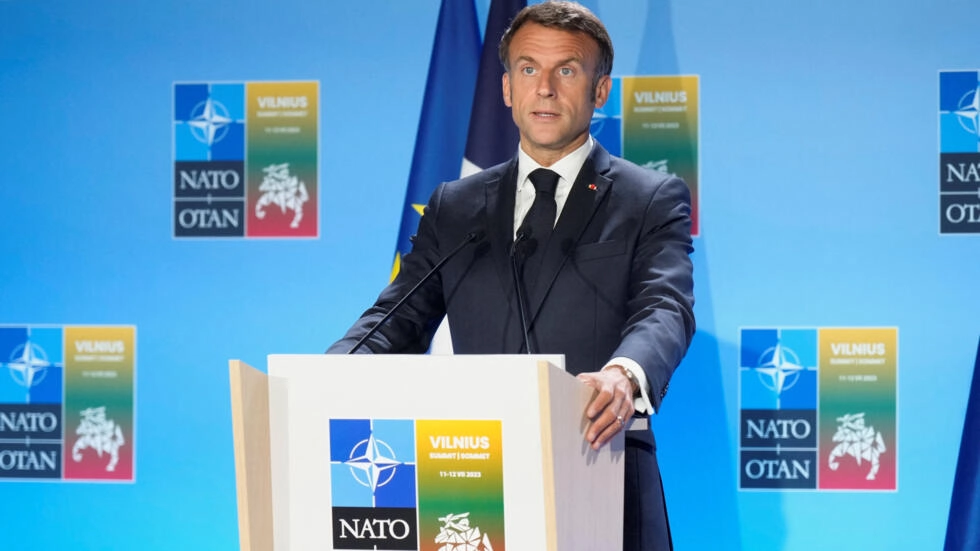On the second and final day of the NATO summit in Vilnius, Lithuania, French President Emmanuel Macron assessed that Russia is militarily “fragile” and that the country will face a Western front determined to provide “sustainable” support to Ukraine. Ukrainian President Volodymyr Zelensky said on Wednesday he was confident of joining the Atlantic Alliance when the war ends.
(RFI) “Russia is militarily and politically fragile, more than some said, and our support for Ukraine is more durable than some thought,” Macron told a news conference after the NATO summit. According to the French head of state, Russia “gave the first signs of division”, referring to the coup attempt by the Wagner group mercenaries, which Macron interpreted as “weakness of Russian power”.
He also admitted that Ukrainians may have been disappointed not to have obtained a more concrete commitment from NATO in favor of their country’s membership in the Alliance. “It is legitimate for the president of Ukraine [Volodymyr Zelensky] to be demanding of us because he is fighting on the ground, his army is engaged and he is defending the integrity of his territory, the sovereignty of his people,” Macron said.
But “this path to NATO is there”, “the most direct path has been opened for Ukraine”, he assured. “In my view, we did what we had to do,” the French president added. “At this time of great uncertainty, a clear message must be sent to Russia that it will not divide or exhaust European partners and allies (…) and that Ukraine’s aspiration to join the Alliance will be respected,” he concluded.
On Wednesday, the G7 powers promised to provide long-term military support to Ukraine, a move welcomed by President Volodymyr Zelensky. He stressed, however, that this should not replace his country’s future membership of the military alliance.
“Future armed attack”
Nearly 18 months after the Russian invasion began, the members of the G7 (the United States, the United Kingdom, France, Canada, Germany, Italy and Japan) presented a plan for Ukraine’s security. The aim is to help the country cope with the current Russian offensive and to deter Moscow from any “future armed attack” against the neighboring country.
This announcement, which angered the Kremlin, was described by Zelensky as “an important victory for Ukraine’s security”. However, in his opinion, “the best guarantee for Ukraine is to be in NATO”. The day before, he had sharply rebuked the alliance’s leaders for failing to set a timetable for his country’s integration into the organization after the end of the war.
“Ukraine’s future is in NATO,” US President Joe Biden said. Meanwhile, “we will help [the Ukrainians] build strong defensive capabilities on land, at sea and in the air,” he added, before praising the country’s courage, an example “to the whole world.”
“We must ensure that when the war is over, credible mechanisms are in place for Ukraine’s security, so that history does not repeat itself,” said NATO Secretary General Jens Stoltenberg.”Today, we face each other as equals and I look forward to the day when we will meet as allies,” continued the Norwegian, who has just been reappointed for a year at the head of this organization.
Conditions for Ukraine’s membership
On the first day of the summit, the leaders pledged to shorten the process that Kiev would have to follow to join NATO. “We may extend an invitation to Ukraine to join the Alliance when the members decide and the conditions are met,” the final statement said.
For Volodymyr Zelensky, those conditions are “linked to security”: “we understand that Ukraine cannot become a member as long as the war continues”. He said he was “confident” of joining “after the war”.
German Chancellor Olaf Scholz, meanwhile, recalled that these conditions “laid down in NATO rules and known to all” concern, in particular, issues of “democracy and the rule of law”.
The final communiqué of the Vilnius summit does not go much further than the commitment formulated in 2008 on the future integration of Ukraine. The United States, which is the leading military power, fears being drawn into a possible nuclear conflict with Russia.
Zelensky has held bilateral talks with several leaders, including Biden, who advocates a model similar to the one reached with Israel, under which Washington promised to provide substantial military aid over time.
Tonight, the US president will deliver a speech at Vilnius University in which he will outline Washington’s commitment to defending every square inch of NATO territory.
